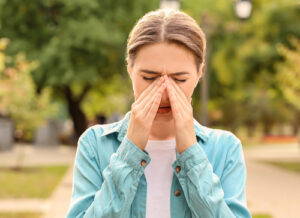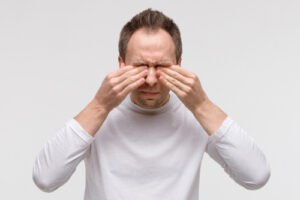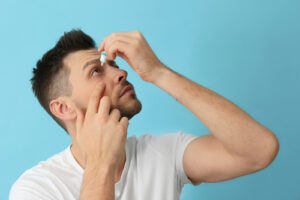Certain irritants in the springtime air can cause allergies that trigger symptoms like itching, tearing, and irritation. These symptoms are also common in those who have dry eye syndrome.
You may be wondering whether your symptoms are due to dry eye syndrome or result from allergies. Keep reading to find out whether you may have dry eye syndrome or allergies!
What Is Dry Eye Syndrome?

Millions of people worldwide experience dry eye syndrome. This eye condition results from inadequate lubrication on the front surface of the eyes.
It can be caused by your eye’s inability to produce enough tears or an issue with the quality of the tears themselves. Tears play a vital role in the health of our eyes and our vision.
They provide a smooth surface to ensure your eyes remain comfortable. By keeping the cornea lubricated, tears also allow you to see clearly.
Without them, our eyesight would be blurry. Tears also act as a barrier between our eyes and the outside world.
They protect this vulnerable part of our bodies from dust, bacteria, and other irritants.
Tear Film Layers
A layer of tears, referred to as the tear film, is distributed across the eye with each blink. While tears may seem like only water, there are actually made of two other critical components: oil and mucus.
These three layers work together to keep the entire surface of your eye moist and lubricated. A different gland produces each layer of the tear film.
The aqueous, or water layer, makes up the largest portion of the tear film. Lacrimal glands above the eyelids produce the aqueous layer.
After the tears have moisturized the eye’s surface, they drain from the eye through the tear ducts located at the inner corners of your eyes.
What Causes Dry Eye Syndrome
An issue with any aspect of this system, including the glands that produce each layer, can lead to dry eye. Some people develop dry eye syndrome as they age, especially women post-menopause.

Certain medications can also cause your eyes to feel dry as a side effect, such as antihistamines and birth control pills. Another cause of dry eye syndrome can be conditions like Sjogren’s syndrome, rheumatoid arthritis, and thyroid disorders.
Your environment and lifestyle choices can contribute to dry eye symptoms as well. Wind and dry air can reduce the moisture in your eyes, as can wearing contact lenses for an extended period of time.
If you spend a lot of time on the computer, you may experience dry eyes. Since you don’t blink as much when looking at the screen, too much time screentime can dry your eyes out.
Symptoms of Dry Eye Syndrome
Most individuals with dry eye syndrome will experience one or more of the following:
- An itchy, scratchy, or burning sensation
- A feeling like something is in the eye, such as dirt or sand
- Eye pain
- Light sensitivity
- Mucus around the eyes
- Redness
- Blurry vision
- Watery eyes
Many people are surprised to learn that excess watering can indicate dry eye. If your eyes do not produce good-quality tears, they will not be able to lubricate your eye adequately.
Since these tears lack the components to stay on the eye and moisturize the cornea, you will end up experiencing increased tearing.
How Does Dry Eye Syndrome Differ from Allergies?
You may experience symptoms similar to dry eye syndrome when you have allergies. Common eye-related symptoms caused by allergies are itchiness, redness, or watery eyes.

While there can be some overlap between the two conditions, allergies are often accompanied by other symptoms unrelated to dry eye. These include:
- Sneezing
- Runny or stuffy nose
- Postnasal drip
- Itchy mouth, nose, or throat
- Ear congestion
- Headache
- Cough
- Eyelid swelling
One of the most common ways to tell dry eye syndrome symptoms apart from allergies is the degree of itchiness and the presence of swelling. Allergies often bring on a more intense itch than dry eyes.
You will not typically experience swelling or puffy skin around your eyes with dry eye syndrome. Unlike dry eye syndrome, allergies occur when your immune system responds to an airborne irritant.
The chemicals that it releases into your system as a response cause an allergic reaction. It is also possible to have both dry eye syndrome and allergies.
In some cases, allergies can lead to the development of dry eyes.
Dry Eye Treatment

The methods eye doctors use to treat dry eye syndrome differ from their methods to treat allergies. Many eye doctors will recommend antihistamine eye drops to treat eye-related symptoms caused by allergies.
However, these types of eye drops will not be very effective if you are suffering from dry eye syndrome caused by an underproduction of tears. By finding the root cause of your symptoms, your eye doctor can develop a treatment plan to reduce your symptoms.
If you’re uncertain whether your symptoms result from dry eye syndrome or allergies, visit your eye doctor at Cheema MD Eye Care. At this visit, your eye doctor will perform a comprehensive evaluation to determine the cause of your symptoms.
Do you want help determining whether your symptoms are due to dry eye syndrome or are a result of allergies? Schedule an appointment at Cheema MD Eye Care in Kingston, NY, today!



